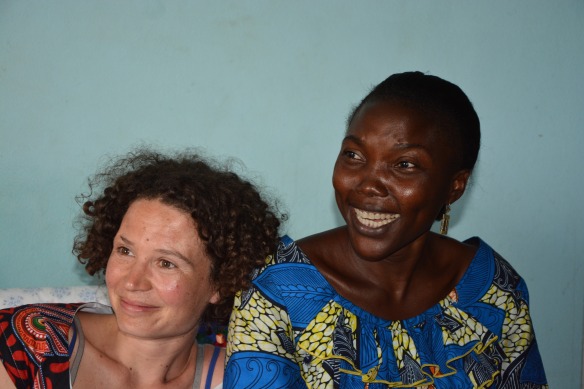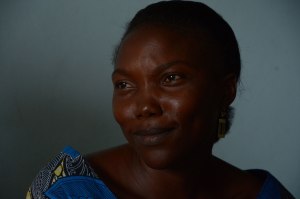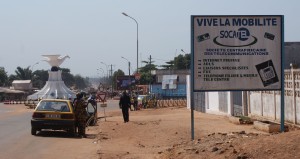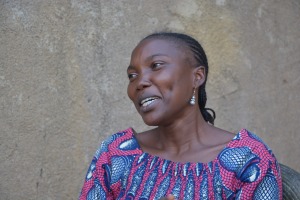Co-author: Catherina Wilson, PhD researcher in the project ‘Connecting in Times of Duress’, http://www.connecting-in-times-of-duress.nl
The civil war in the Central African Republic started in March 2013 when the Seleka (Northern) opposing rebel coalition realized a coup d’état, chasing Bozize from office. Instead of a transition government, hatred and violence were installed and led to chaos and violence in Bangui, the capital, and beyond. Many people had to flee, especially those considered ‘strangers’; a xenophobia against Chadians and Muslims became a main discourse and harsh practice of life in CAR.
Invisible counter voices are probably the most numerous, but also a contradiction. When one is not heard or seen, can one be a counter voice? Indeed big feats are realized by these silent voices. Our search for counter voices does not only focus on public events, on ‘ hearing’ and ‘seeing’, because it would amount to a neglect of those silent and invisible heroes. In Africa invisibility is gendered: Women are often invisible in the public and political spheres, yet acting decisively at the background. Juliette from Chad but living in Bangui, is certainly an example.
Busy job
It was so nice to meet Juliette again in N’Djamena (Chad) in March 2014, where we did not expect to meet, and a month later again, in Yaoundé (Cameroon). People move in spite of war. As such, our team has met Juliette at various reprisals and slowly but surely she has become entangled in our work. Our first encounter, in the Autumn of 2012, was in Bangui and with her busy job at the European Union office she then had no time to visit her family in N’Djamena. The (civil) war made her life different, but by no means less busy. When we encountered her about a year later, in August 2013, Juliette seemed to be at the heart of exchanges on the events in Bangui, calling and walking around with three phones, a walkie-talkie and a radio.
Bombarded convent
This is not the first time Juliette endures a crisis. Juliette has many stories to tell and she has been confronted with a lot of atrocities and (political) violence in her life, both in conflict ridden Chad and the flammable Central African Republic – countries among the poorest nations of Africa and with a long history of war and conflict.
Her youth was not easy, in terms of poverty and not having anything to eat besides manioc flower and sewing little things for babies in order to take care of her younger siblings. Later, as she decided to become a nun, the convent where she stayed was heavily bombarded by the French in the late nineties. It was actually a wonder the nuns survived the attack, the French were astonished to see them walk out alive.
Feminist in action
Juliette was eager to study. She left Chad for Bangui where she went to university, without any means to survive. She left with only 1500 FCFA (almost € 2,50), just enough to arrive. A nice traveler gave her 50.000 FCFA (about € 80), for which she bought the plastic cords out of which baskets and other utensils are woven. That is how she earned some money and was able to fund her studies. But it was a struggle to receive her degree in Sociology from the University of Bangui. Juliette proudly showed us her thesis, yet her university experience was not necessarily a positive one. Male professors do not always think rationally and forget to look past the attractive looks of young female students. Beyond exemplary works, they look for exemplary bodies. Juliette was one of those bodies and as she refused to be seduced into obtaining easy grades, the professors made her graduation almost impossible. But she fought, challenging the professors to point out the mistakes in her methodology, a real feminist in action! To think that Juliette should have been born a boy! When her father found out that his sixth child was again a girl he refused to accept it, and by way of punishment, or maybe from disappointment, he neglected her mother who fell ill, and the girl was raised as a boy. ‘That is why I have become who I am.’
Funding dozens of students
Despite her disillusionment with the academic institution, Juliette discovered the importance of scholarship and erudition that can be obtained through study. Her determination gave her the dignity and beauty that she embodies so elegantly. Actually, the fact that our team works and resides with her is by no means a mere coincidence, but rather based on her philosophy of supporting academia, not the institution, but the people, and through the people, the knowledge.
And thus learning and studying by herself and for others became her vocation. ‘It is the only way forward.’ And this is where her social project crystalizes. She wishes the best education, not only for her two daughters, but also for so many others. She invests part of her salary in funding schooling of young people in Bangui: her cousins, but also people from Centr’Afrique; ‘ it doesn’t matter’ . She has been able to fund dozens of young students in this way. Some have gone back to Chad, others are still in Bangui and visit her regularly. This is Juliette’s quiet contribution to the development of her two countries (Chad and CAR), to end the madness of the region. In her opinion the only way.
Vulnerable position
When the Seleka conquered Bangui in early 2013, Juliette was living there with her two daughters. They lived in a relatively well-protected house and certainly at the beginning she did not feel threatened. Juliette would cheerfully tell us about the drinking under the mango tree, about the shooting, the taking cover inside for a couple of minutes before regaining the mango tree to continue drinking as the shooting had calmed down. There is also a normality to war, just like any other anecdote. Yet the atrocities against Chadians soon increased. Juliette as a Christian was less at risk, so she assumed. However, with the intensification of the violence her situation has now changed. Her children have left for Chad, where they stay with their aunt in N’Djamena. They ‘fled’ Bangui in a plane where they were packed like animals. Juliette on the other hand, decided to stay. She likes her job and would not leave it. Her boss would not let her go either and so she became one of the only Chadians at her office. This vulnerable position leads her to keep up an exaggeratedly friendly attitude to all, even to the point of not denouncing colleagues who she sees stealing, fearing that they will accuse her of being a foreigner among the Centr’Africains. Nowadays she does not even dare to wear the accompanying headscarf so characteristic of the three-pieced African dress; she fears that covering her head would associate her with Islam. No, the conflict is not religious but many of those who have fled, have done so also for religious reasons, misplaced associations in chaos turn lethal.





